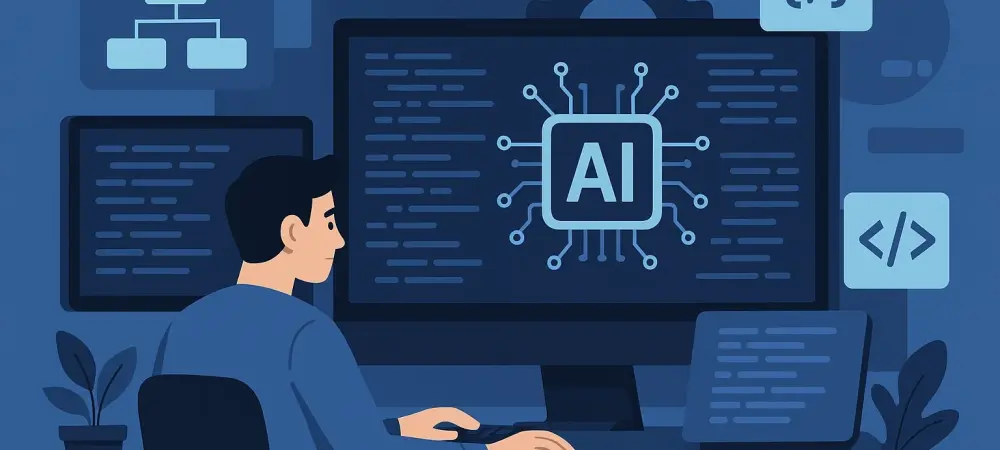Artificial Intelligence (AI) is increasingly becoming entrenched in the fabric of software development, offering unprecedented assistance to developers worldwide. With its ability to automate, optimize, and provide real-time feedback, AI is reshaping code generation and enhancing productivity significantly. While the potential benefits are myriad, a pertinent question arises: can AI manage coding tasks autonomously, or does it necessitate human collaboration to ensure optimal outcomes? Developers have found AI beneficial for speeding up processes, but relying solely on AI can be problematic due to its limitations in understanding deeper contextual nuances and ethical concerns surrounding code usage. The balance between AI’s automation capabilities and human expertise emerges as a crucial factor in producing reliable and innovative software.
Collaborative Advantages Between AI and Human Developers
AI-Assisted Coding: Streamlining Tasks
AI has been instrumental in revolutionizing coding by executing repetitive tasks quickly and providing immediate guidance, especially advantageous to novice programmers. These tools excel at code generation and error detection, analyzing vast libraries of existing code to offer helpful solutions and suggestions. Coders are relieved from mundane tasks, allowing them to focus on creative and complex aspects of development. However, despite these efficiencies, AI remains challenged by contextual understanding, which often leads to erroneous or ineffectual solutions. Its scope lacks comprehending business objectives, resulting in code that does not fully adhere to specific project nuances without human intervention. Thus, while AI effectively streamlines particular processes, its limitations underscore the necessity of human input for achieving broader coding goals.
Human Oversight: Mitigating AI Limitations
Human developers bring to the table critical skills that AI cannot emulate, including domain expertise, ethical judgment, and contextual understanding. These professionals are essential to maintaining quality, security, and compliance, ensuring that business goals and legal standards are met. AI might inadvertently suggest code lines from open sources that feature outdated practices and licensing conflicts, risking legal implications. Human oversight prevents these issues, ensuring robust code security and adapting algorithms to scale and evolve with technological advancements. While AI assists in speeding tasks, the irreplaceable human qualities of critical thinking and decision-making remain pillars in software development processes. Collaborative efforts between AI and humans are paramount in achieving groundbreaking solutions that stand the test of time.
Future Outlook for AI and Human Partnerships
Training Developers for AI Collaboration
The future of coding aligns with fostering partnerships where developers are adept at leveraging AI efficiently while ensuring high-quality software output. By adopting a collaborative approach, developers can capitalize on AI’s strengths to enhance productivity while guarding against its possible pitfalls. Training programs and experiential learning must emphasize this symbiotic relationship, equipping developers with the skills needed to navigate complex challenges while utilizing AI tools effectively. As AI continues evolving and integrating into development practices, educational efforts should focus on integrating AI capabilities with human expertise in a well-rounded manner. The symbiosis of AI automation and human judgment is vital for unlocking new possibilities within software development.
AI in Coding: A Complementary Role
As AI technology progresses, there is no indication that it will wholly replace human developers. Instead, AI will continue acting as a powerful complement to the work of skilled professionals in programming. The partnership between AI and human developers promises advancements that drive innovation and enhance efficiency in engineering solutions. Moving forward, cultivating open-minded collaboration will be indispensable for fostering inventive solutions and maintaining competitive advantage. With developers balancing technological insights and AI’s capabilities, the industry is well-positioned to embrace the future positively, turning challenges into opportunities through smart, combined strategies.
The Essential Human-AI Symbiosis
As AI technology advances, it’s clear that it won’t completely replace human developers. Instead, AI will continue to serve as a powerful tool that complements the work of skilled professionals in the programming field. The collaborative partnership between AI and human developers is set to bring about breakthroughs in innovation, driving efficiency in creating engineering solutions. As we look ahead, fostering open-minded collaboration will be crucial in developing inventive solutions and ensuring competitive edge. Developers will need to harmonize their expertise in technology with AI’s capabilities to position the industry to welcome future challenges as opportunities. This synergy—leveraging both human creativity and AI’s analytical power—promises to turn potential hurdles into stepping stones for growth. Through intelligent strategies that combine human and machine efforts, the industry stands poised to embrace the future positively and productively.

